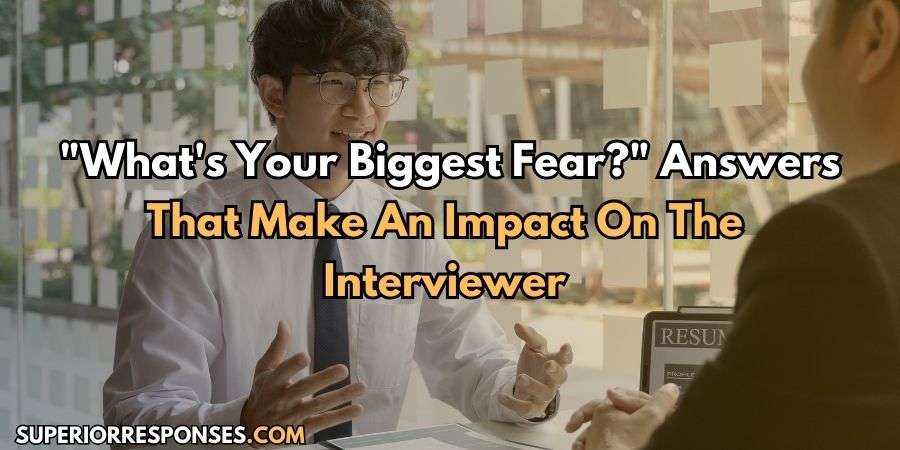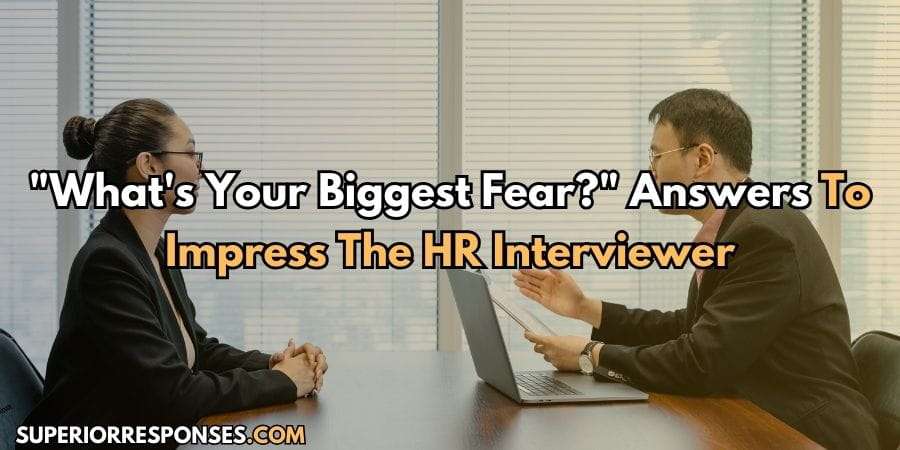Discussing your biggest fear in an interview can often feel like a test of your honesty and self-awareness. This question often stumps candidates, not because they lack fears, but because they are careful not to waste this chance by giving weak answers that might undermine their image as a confident person.
Instead of saying you have ‘no fear at all,’ which can seem disingenuous, it’s better to help build trust and make a good impression by sharing answers that reflect a balanced perspective on personal weaknesses and strengths.
We’ve covered examples of answers that accomplish this, avoiding pitfalls while showcasing how you handle and challenge your greatest fear in a way that enhances your candidacy.
Contents
- 1 Good Answers To “What Is Your Biggest Fear?”
- 2 Professional Answers To “What Is Your Biggest Fear?”
- 3 Why Do Employers Ask About Your Greatest Fear?
- 4 Strategies to Communicate Your Fear Without Undermining Your Qualifications
- 5 Avoid These Pitfalls When Answering Fear Questions Interview
- 6 How To Impress The Interviewer With Your Answer?
- 7 The Importance Of Authenticity When Discussing Fears
Good Answers To “What Is Your Biggest Fear?”
- 1. “I often worry about being judged or doubted at work. It’s challenging, but it pushes me to prove my worth.”
- 2. “I fear wasting time on tasks that aren’t meant for my passion. I strive to align my daily duties with what I love.”
- 3. “Being ignored or overlooked in discussions is tough. I make sure to speak up and share my ideas clearly.”
- 4. “The thought of not being able to help others when they need it in the office makes me anxious.”
- 5. “Late feedback or no feedback at all is a concern. I rely on it to improve and grow in my career.”
- 6. “My honest, secret fear is that my life’s work might end up not aligning with my ultimate passion.”
- 6. “My honest, secret fear is that my life’s work might end up not aligning with my ultimate passion.”
- 7. “It’s hard admitting that my biggest fear is being unsupported when I pitch new ideas.”
- 8. “It worries me to think I might not meet the high standards I set for myself.”
- 9. “I get nervous about the possibility of not connecting well with my colleagues.”
- 10. “I worry about not having the opportunity to prove my full potential.”
- 11. “I fear not making a significant impact with my work. I want to contribute in meaningful ways that really benefit the company and our clients.”
- 12. “I fear becoming complacent. I believe that curiosity leads to innovation, and losing that would mean not fulfilling my potential or contributing effectively to my team.”
- 13. “I fear getting so focused on the big picture that I might miss critical details. To manage this, I have developed a system of checks and balances in my work routine.”
SUGGESTED: Reschedule The Interview – 27+ Excuses They Always Buy
Professional Answers To “What Is Your Biggest Fear?”
- 1. “My fear is that I won’t be able to balance quality with deadlines effectively, but I continuously work on improving my time management skills.”
- 2. “I am most apprehensive about not meeting the expectations set for me, as I strive to contribute effectively and meaningfully in my roles.”
- 3. “One of my concerns is not being able to maintain a healthy work-life balance, which I believe is crucial for long-term success and well-being.”
- 4. “I’m cautious about becoming complacent in my career. I always look for ways to challenge myself and grow professionally.”

- 5. “My professional fear is not building strong relationships with colleagues, as teamwork is crucial for success in any business.”
- 6. “I worry about being unable to deliver results under pressure, so I’ve honed my skills in managing stress and organizing tasks efficiently.”
- 7. “My biggest fear is that I might miss out on important advancements in my field that could enhance our operations or efficiencies.”
Why Do Employers Ask About Your Greatest Fear?
Employers often include the “What is your greatest fear?” question to assess a candidate’s honesty and personality. Hiring managers use this common interview question not only to gauge how honest you are in admitting your fears but also to determine how well you can cope with stress.
It’s a way to see if you are reliable and comfortable communicating about your weaknesses, which are crucial traits for any employee.
RELATED: 10 ‘What Keeps You Up At Night?’ Replies From Hired Ones
Moreover, this question helps the hiring manager evaluate if you are a good match for the specific role based on how your personal traits align with the job description. For example, a candidate admitting a fear of heights might not be ideal for a position as a wind turbine technician.
Strategies to Communicate Your Fear Without Undermining Your Qualifications
When discussing a fear that relates to the job you are applying for, such as being nervous about public speaking, it’s important to frame it in a way that shows your honesty but also assures the interviewer that this fear does not interfere with your job responsibilities.
A good strategy is to follow up on your admission by explaining how you are working on overcoming this challenge. For instance, you might mention taking classes, practicing at home, or seeking advice from more experienced speakers. This demonstrates a proactive attitude and a commitment to self-improvement.
End on a positive note by sharing a recent instance where you faced this challenge head-on, perhaps during a presentation or meeting. Highlight how you managed the situation with increasing confidence and how the progress you’ve made has been a great feeling.
SUGGESTED: Professionally-Impactful “Sorry For Late Reply” Email Responses
This approach subtly impresses upon the interviewer that you are a committed professional capable of managing and growing through personal challenges.
Avoid These Pitfalls When Answering Fear Questions Interview
It would be best if you avoided the temptation to share your deepest, darkest fears as this can make the interviewer uncomfortable. For instance, while it might be honest to talk about being afraid of spiders, it’s hardly relevant to the job unless you’re applying for a position in entomology. Keep the fear related to the professional setting, like nervousness about public speaking.

Another pitfall to sidestep is being overly negative about your fears. If you mention a fear such as not meeting deadlines, frame it in a way that connects to being timely and responsible. Explain how you’ve started using techniques like setting earlier deadlines for yourself to ensure that everything is done timely.
How To Impress The Interviewer With Your Answer?
When asked about your biggest fear, it’s vital to choose a response that shows you’re human yet committed to improving. For example, a common fear like “not meeting deadlines” is something many can relate to.
SUGGESTED: 14 Replies To “Sorry” From Boss That Made Employees Heroes
It’s important to talk about how you are working to overcome this by using a planner and setting earlier deadlines to stay on track. This kind of honesty makes you appear smart, aware, and actively taking steps to improve.
When you answer honestly about a fear, you make it less likely for the interviewer to feel uncomfortable; they see that you care about doing your job well and are willing to work on your challenges.
The Importance Of Authenticity When Discussing Fears
Just think, telling a friend about what scares you often leads to deeper understanding and connection; the same holds true in interviews. Employers don’t just want to hear a made-up story; they want to know how you deal with fears because it helps them understand if you’ll fit well in the role.
Being open and honest about your real fears not only makes a good impression on your interviewer, it also paints a true picture of how you deal with challenges. For instance, if you share that you struggle with public speaking, it shows you’re not only trustworthy but also that you’re willing to approach personal hurdles head-on.
You May Also Like These:


